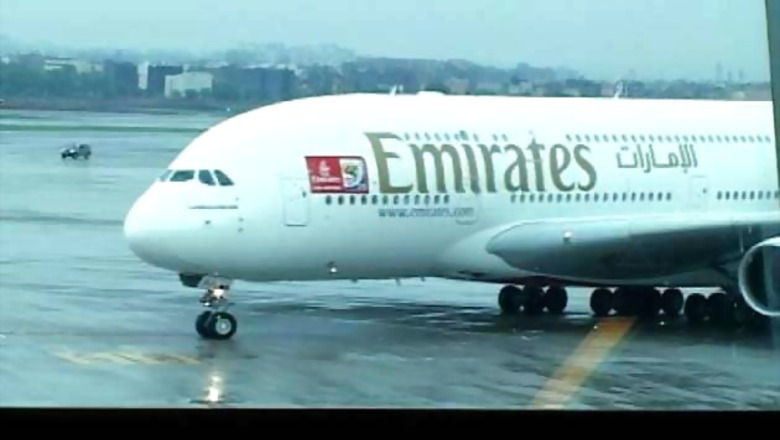
views
New Delhi: Gulf carrier Emirates on Wednesday announced the launch of its A-380 operations between Mumbai and Dubai from July 21 adding a capacity of 2,127 seats per week in each direction.
It will be the second global carrier after Singapore Airlines (SIA) which was set to start its superjumbo flights from Delhi and Mumbai on May 30. Emirates would launch daily services of the double-decker Airbus A-380 aircraft between Dubai and Mumbai, a spokesperson for the Gulf carrier said.
Emirates, which currently has 48 A-380s in service, also announced plans to enhance the network of this aircraft to 28 destinations from the same day in July. In addition, the Dubai-based carrier said it would deploy Boeing-777s to Delhi and Hyderabad to serve growing demand.
Delhi would have 980 additional one-way weekly seats while Hyderabad would add 672 more seats. A combined total of 3,779 one-way weekly seats would be deployed on Mumbai, Delhi and Hyderabad through these aircraft upgrades, the Emirates spokesperson said.
The Gulf carrier's decision followed the recent bilateral talks between governments of Dubai and India, which provided a phased increase of 11,000 seats for Dubai carriers. The Emirates A-380 would accommodate 489 passengers - 14 in private First Class suites, 76 in Business Class and 399 in Economy.
SIA had earlier this month announced the launch of its A-380 services from May 30, becoming the first airline to introduce daily superjumbo flights from Delhi and Mumbai. Its A-380s can fly 471 passengers in a three-class configuration of first class, business and economy. It was the first airline in the world to operate the A-380 in October 2007 between Singapore and Sydney.
Lifting a five-year-old ban, UPA-II government had cleared decks for A-380 operations from Delhi, Mumbai, Hyderabad and Bangalore in January. The restriction was lifted after demands made by major foreign carriers, including Germany's Lufthansa.
The ban was imposed in 2008 as the government then felt these double-decker, wide-body and long-haul jets would take away a large chunk of global traffic to the detriment of the Indian carriers' interests.
Emirates' Senior Vice President, Commercial Operations (West Asia & Indian Ocean) Ahmed Khoory said, "We look forward to working with the new Government in India to grow India's economy through enhanced aviation connectivity and to realise India's ambition to grow its international aviation market to 85 million passengers by 2020."
Delhi and Mumbai airports have already received DGCA certification to receive the superjumbos and gearing up to meet various requirements to handle the large number of passengers these planes can accommodate when they land or take off.

















Comments
0 comment